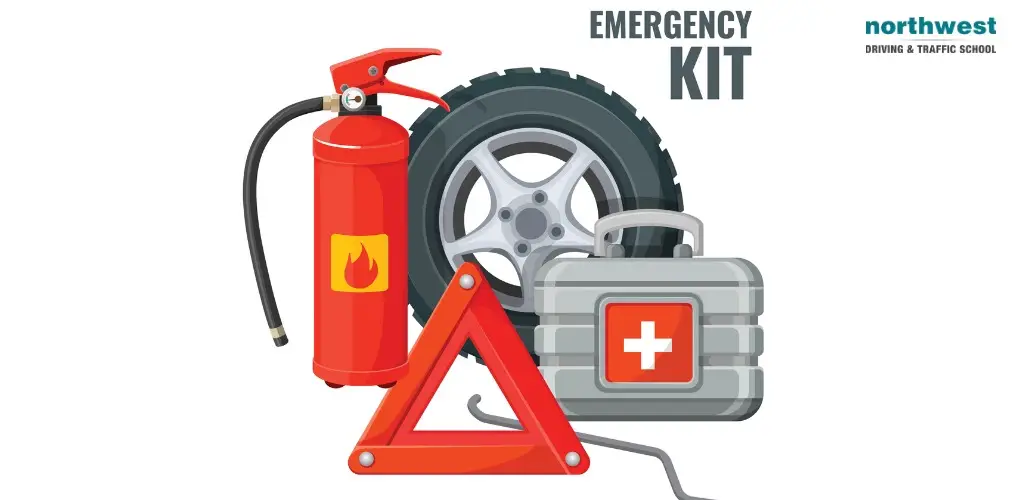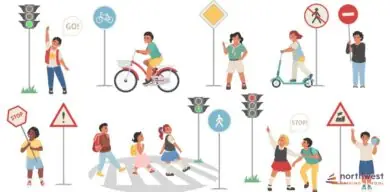- Traffic School
What Should You Include In Your Emergency Car Kit?

An emergency car kit is something every driver should have and hopefully never need. Covering everything from running out of gas to minor car accidents, a good emergency car kit will have everything you need to stay safe and visible until either roadside assistance or the authorities arrive to help you.
Exactly what you have in your kit depends on where you spend most of your time driving. Here in Nevada, it’s always a good idea to have plenty of water and something to shade you from the sun, especially in the baking hot summer months. If you happen to live in Minnesota, you’d be well advised to keep warm clothing on hand if you find yourself stranded. To help you build up your emergency car kit, we’ve suggested a few essentials and some handy extras to get you started.
Read More: What Should I Do If My Car Breaks Down?
The Basics
Roadside Flares –
If you find that you are stranded, out of gas, or have been involved in an accident, making yourself visible should be a priority. Road flares are a quick and easy method of making yourself extremely visible, aiding roadside recovery or the emergency services in finding you and warning other road users of an accident and potential debris on the road.
Jumper Cables –
Nearly every car owner has had to deal with a dead battery, which can occur for various reasons: temperature, battery age, faulty connections, or even leaving the headlights on while shopping. In these situations, it’s normally a good samaritan that comes to your aid, offering to jumpstart your car, however, without jump cables you are back to square one, so it’s always a good idea to have a set on hand.
Brake Fluid/Oil/Water –
Regular check-ups of your car’s oil, radiator level, and brake fluid should prevent you from running into any issues on the road. However, if you find your car is leaking vital fluids, having extra brake fluid/oil/water to hand will allow you to get to the next service station without your engine seizing up.
Extra Fuses –
Modern cars rely heavily on electronics, so keeping extra fuses on hand is as advisable as extra brake fluid/oil/water. A blown fuse normally indicates a larger problem with your car’s electronics, so it’s a good idea to visit a mechanic if you find one has blown, but having spares on hand will normally allow you to get home without calling roadside assistance.
Work Gloves –
Emergency repairs on a car can be hard on the hands, especially if it is a physical job like changing a tire. Keeping a solid pair of work gloves in your emergency car kit will reduce the chance of getting painful abrasions while conducting those repairs.
A First-Aid Kit –
A good first aid kit will have everything you need to react to various situations, from mouth shields for CPR to tourniquets to stop bleeding. Most first aid kits are designed for the home only and contain basics like bandages and antiseptic, so when you are picking one for your car, it might be worth investing in a kit designed for use by trekkers and mountaineers to give you access to a larger variety of first aid equipment.
Bottled Water/ Granola Bars –
Whether you are stranded or have been involved in an accident, staying hydrated and having access to sugar is vital while you wait for help. Bottled water and easy-to-store foods, like granola bars, are excellent ways to ensure you don’t add hunger or dehydration to your list of automotive problems.
Tools –
Nearly every form of automotive repair requires tools, so it’s a good idea to assess exactly what tools you will need to make basic repairs to your car and ensure you have them stored with your emergency car kit at all times.
Added Extras
The items above make a great start to your emergency car kit but are only the start. When you are building your own emergency car kit, it is important that you tailor it to your unique driving experience. Below are a few additional extras to be added to your kit to personalize it to your normal driving environment.
One Gallon of Antifreeze
A Blanket
Winter Clothing
Heat Packs
Flashlights and Batteries
Tire Pressure gauge
Duct Tape
Paper Towels
Washer Fluid
Pocketknife
Spare Mobile Phone
Sunshade



